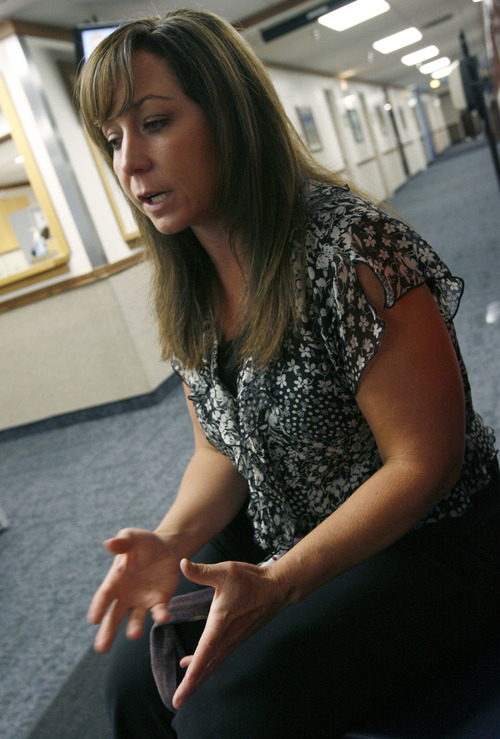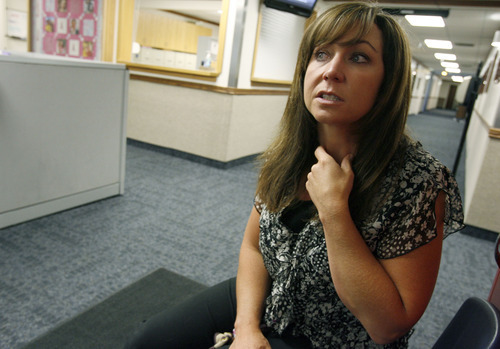This is an archived article that was published on sltrib.com in 2012, and information in the article may be outdated. It is provided only for personal research purposes and may not be reprinted.
Kim Foy went to five doctors in May, trying to pin down the cause of a nagging cough that kept her gasping for air for hours every night.
She was treated for bronchitis, asthma, allergies and sinus problems. But her coughing persisted, forcing her to sleep in a recliner in her living room with the windows open so the cool spring air could cycle through her aching lungs.
Her coughing fits were sometimes so severe she vomited. "I knew it wasn't a normal cough," Foy said.
Finally, on June 1, she was tested by a doctor who found the diagnosis: whooping cough.
Foy was instantly worried she may have been contagious and passed the disease on to her fourth-grade class at Heber Valley Elementary.
"I was really upset and devastated that I'm a teacher and how many people I put at risk without knowing I had whooping cough," Foy said.
Foy, 41, is just one of hundreds of Utahns who have contracted whooping cough, which is sweeping through the state.
"It's [infecting] record numbers, and it's raging through the county. In fact, numbers are elevated statewide," said Ilene Risk, epidemiology bureau director for the Salt Lake Valley Health Department.
Risk said 280 cases of whooping cough have been reported in the valley so far this year, and it's estimated that each case represents 10 to 20 cases that go unreported. In the past two weeks, 21 new cases have been tallied, which is 10 more than the five-year average during the same time frame, Risk said.
According to the Centers for Disease Control and Prevention (CDC), Utah is one of 37 states that has reported increase in cases of whooping cough, also known as pertussis, through July compared with the same month in 2011. More than 17,000 cases were reported to CDC through July 12, including 10 pertussis-related deaths. Most cases occur in infants, but rates are also increasing in children ages 7 through 10 and in adolescents 13 and 14.
Pertussis infects people of all ages, but is particularly dangerous for babies under 12 months old. The disease includes typical cold symptoms that gradually develop into violent coughing fits, which can persist for weeks.
Babies usually begin a series of five shots to protect against whooping cough before they turn a year old, but they are not fully immunized until the series is completed, Risk said.
"They're really at risk for fatal illness and really serious disease," Risk said.
Whooping cough numbers are also high in Davis County, which has counted 44 cases in 2012, compared to 12 in all of 2011. Davis County Health Department epidemiologist Brian Hatch said the number of people infected this year could top 2005, when 66 cases were reported.
"We're far exceeding what we have seen in the last few years," Hatch said.
Hatch said the Utah epidemic may be the result of an outbreak in California a few years ago, which has spread to other states.
"Pertussis tends to cycle, and when it gets there, it continues to spread until we can put control measures and prevention efforts in place," Hatch said.
Some of those prevention efforts include a booster shot that kids are encouraged to get around age 11 and the Tdap vaccine, which protects adults by immunizing them against tetanus, diphtheria and pertussis.
Both epidemiologists stress vaccination is the only true safeguard against the disease, but they also advise people who believe they have whooping cough to see a doctor, wash their hands often and stay away from babies.
Numbers have also run high in Box Elder, Cache and Rich counties, where 57 cases were recorded last year and 12 have been reported since July 1, according to Bear River Health Department spokeswoman Jill Parker.
"That's a lot of cases for that short amount of time," Parker said.
Pertussis is contagious until treated with an antibiotic regimen, which usually lasts five days, Risk said. The antibiotic may lessen the symptoms of whooping cough, but beyond that, there aren't many treatment options. Risk said people with whooping cough just have to make themselves as comfortable as possible and ride out the symptoms, which can last up to 100 days.
Foy has had whooping cough for more than 70 days now, and she said she still wakes up in a panicked state, gasping for air.
"My bronchial tubes get so irritated, they start to spasm, so now a coughing attack could end up cutting off my breathing," Foy said. "It's just been horrible."
She said she hopes her experience inspires people to get tested for pertussis if their coughing lasts longer than two weeks and to get vaccinated.
"It just scares me that people just aren't educated that pertussis is coming back," Foy said, "and that it can be so devastating." —
What is pertussis?
Pertussis, also known as whooping cough, is spread through human-to-human contact and causes violent coughing fits. The cough can last up to 100 days.
Treatment • Five-day antibiotic regimen to prevent spread, although symptoms can linger.
Prevention • The Tdap immunization series, available at county health departments and from personal physicians.
Incidence • In 2011, an estimated 15,216 cases were reported nationally. As of July 7, 17,015 cases have been reported nationally this year.
Source • Centers for Disease Control and Prevention







